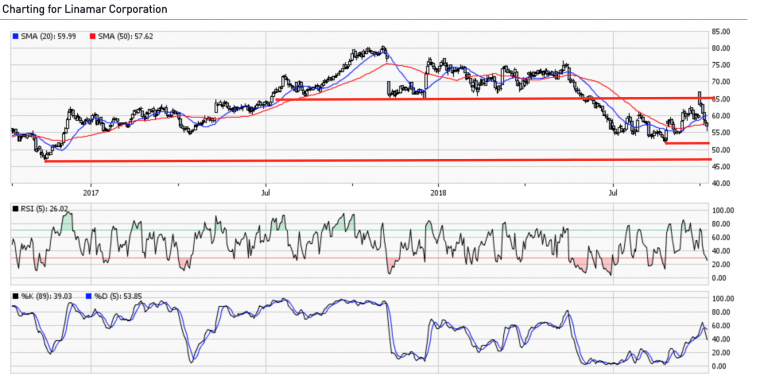How to turn a profit with puts following a technical rejection

How to turn a profit with puts following a technical rejection
As the following chart shows, the price of shares in Linamar Corporation (LNR) surged to a resistance level of $65 after a free trade agreement was reached with the U.S., and it has since been on a steady decline. This response, which does not bode well, could bring the stock back down as far as a support zone of $47 to $52, with a realistic objective of $50, representing a drop of 12%.
Daily Chart for LNR ($56.88 on Tuesday, October 9, 2018)

An investor who agrees with this scenario and wants to profit from it could buy put options expiring on January 18, 2019, selecting the strike that would yield the best return if the stock is trading at $50.00 when the options expire.
We will choose from among the following put options:
- LNR 190118 P 54 at $2.55
- LNR 190118 P 56 at $3.35
- LNR 190118 P 58 at $4.35
- LNR 190118 P 60 at $5.55
Position
Comparative Table of Put Options

As you can see in the above table, of the four put options, the one with the best risk-return ratio is LNR 190118 P 58, at $4.35. It has a potential return of 83.91% if LNR hits the target price of $50.00 on January 18, 2019. So we will execute the following transaction:
- Purchase of 10 put options, LNR 190118 P 58, at $4.35
- $4,350 debit
Profit and Loss Profile
Target price on the put options, LNR 190118 P 58 at $4.35 = $8.00 ($58.00 – $50.00)
Potential profit = $3.65 per share ($8.00 – $4.35), for a total of $3,650
Potential loss = $4.35 per share (the premium paid) or $4,350
Intervention
Even though the target price for shares of LNR is $50.00, our potential profit is tied to the $8.00 target price on the put options. Therefore, as soon as the price of the puts reaches $8.00, we will liquidate the position, even if LNR has not yet reached the target price of $50.00.
Good luck with your trading, and have a good week!
The strategies presented in this blog are for information and training purposes only, and should not be interpreted as recommendations to buy or sell any security. As always, you should ensure that you are comfortable with the proposed scenarios and ready to assume all the risks before implementing an option strategy.
President
Monetis Financial Corporation
Martin Noël earned an MBA in Financial Services from UQÀM in 2003. That same year, he was awarded the Fellow of the Institute of Canadian Bankers and a Silver Medal for his remarkable efforts in the Professional Banking Program. Martin began his career in the derivatives field in 1983 as an options market maker for options, on the floor at the Montréal Exchange and for various brokerage firms. He later worked as an options specialist and then went on to become an independent trader. In 1996, Mr. Noël joined the Montréal Exchange as the options market manager, a role that saw him contributing to the development of the Canadian options market. In 2001, he helped found the Montréal Exchange’s Derivatives Institute, where he acted as an educational advisor. Since 2005, Martin has been an instructor at UQÀM, teaching a graduate course on derivatives. Since May 2009, he has dedicated himself full-time to his position as the president of CORPORATION FINANCIÈRE MONÉTIS, a professional trading and financial communications firm. Martin regularly assists with issues related to options at the Montréal Exchange.
2 Comments
Leave a Reply
The information provided on this website, including financial and economic data, quotes and any analysis or interpretation thereof, is provided solely for information purposes and shall not be construed in any jurisdiction as providing any advice or recommendation with respect to the purchase or sale of any derivative instrument, underlying security or any other financial instrument or as providing legal, accounting, tax, financial or investment advice. Bourse de Montréal Inc. recommends that you consult your own advisors in accordance with your needs before making decision to take into account your particular investment objectives, financial situation and individual needs.
All references on this website to specifications, rules and obligations concerning a product are subject to the rules, policies and procedures of Bourse de Montréal Inc. and its clearinghouse, the Canadian Derivatives Clearing Corporation, which prevail over the content of this website. Although care has been taken in the preparation of the documents published on this website, Bourse de Montréal Inc. and/or its affiliates do not guarantee the accuracy or completeness of the information published on this website and reserve the right to amend or review, at any time and without prior notice, the content of these documents. Neither Bourse de Montréal Inc. nor any of its affiliates, directors, officers, employees or agents shall be liable for any damages, losses or costs incurred as a result of any errors or omissions on this website or of the use of or reliance upon any information appearing on this website.
BAX®, CADC®, CGB®, CGF®, CGZ®, LGB®, MX®, OBX®, OGB®, OIS-MX®, ONX®, SCF®, SXA®, SXB®, SXF®, SXH®, SXM®, SXO®, SXY®, and USX® are registered trademarks of the Bourse. OBW™, OBY™, OBZ™, SXK™, SXJ™, SXU™, SXV™, Montréal Exchange and the Montréal Exchange logo are trademarks of the Bourse. All other trademarks used are the property of their respective owners.
© 2024 Bourse de Montréal Inc. All Rights Reserved.

What on earth is a “technical rejection” ?????
Hi. A technical rejection is: after testing a technical level (price wise), it was rejected (not broken).